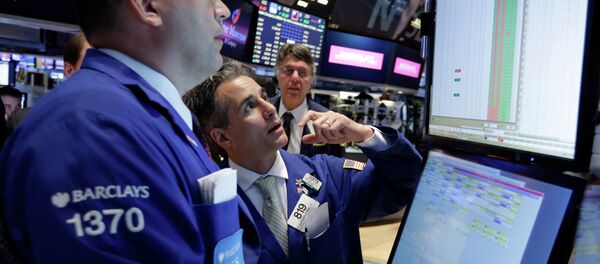Kristian Rouz — Wall Street opened in the red on Wednesday amidst indications of Greek debt talks possibly falling apart once again. The negative impact of the overseas pessimism has been so overwhelming that even the new data showing the contraction of the US economy in Q1 was milder than it was believed to be previously.
Corporate America is sending mixed signals, with Ford Motor, Netflix and Lennar gaining ground, and Alcobra posting the biggest losses. Ford, the US-based automobile-maker, rose 1.4% after the enterprise introduced its new car-sharing schemes in the American and British markets, possibly challenging the traditional model of car ownership and pushing future sales up. The US-based tech enterprise Netflix gained 2.4% after the announced seven-for-one split in stock as the share price nearly doubled over the past 12 months.
The construction firm Lennar, known as one of the biggest US residential developers, also edged 5.5% up after reporting a 33% increase in quarterly profits and a better outlook for the US housing market. The company has been selling more houses at higher prices recently.
Among the losers, the pharmaceutical firm Alcobra Ltd. crashed 15.4% after its autism medications failed at a test during their development.
Selling bets have outnumbered the buying ones, however, on the New York Stock Exchange by 1,557 to 990, while on Nasdaq the sell-buy correlation is 1,334 to 794, respectively.
The negative market sentiment prevailed even after the US Department of Commerce announced the world's biggest economy shrank in Q1 less than previously estimated. US GDP fell 0.2%, according to a revised measure, as compared to the previously reported decline of 0.7%.
Right now, all eyes are on the the macroeconomic trend, as there is still a 50-50 chance of the Fed interest hike in September. In case the US economy has accelerated from its sluggish start at the begining of the year, the market will be adjusting to the forthcoming increase in borrowing costs. That said, the better the macro data is, the dearer the dollar and the US-based assets will eventually be — only to see a rapid sell-off at their highest value immediately after the interest rate is revised.
The Commerce Department also reported stronger than initially estimated US exports and increased personal savings. The global turmoil and the more solid US data propelled the demand for US governmental debt. The 10-year Treasury rose with a slightly lower yield, while the greenback is flat.



